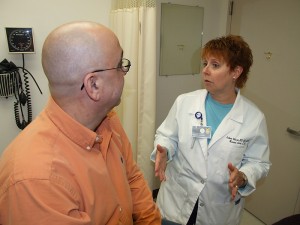
The Carole and Ray Neag Comprehensive Cancer Center once again has received a three-year accreditation with commendation from the American College of Surgeons Commission on Cancer.
It’s the highest possible overall rating from the surveyor conducting an on-site review.
“This is the second such award in the past two surveys,” says Dr. John Taylor, who chairs the Health Center’s cancer committee. “It is a testament to the great people in and care provided by the cancer center and all those who work with cancer patients and their families.”
The UConn Health Center first received Commission on Cancer accreditation in 1977 and has maintained that status ever since.
According to the Commission on Cancer, five elements are key to the success of an accredited program:
- The clinical services provide state-of-the-art pretreatment evaluation, staging, treatment and clinical follow-up for cancer patients seen at the facility for primary, secondary, tertiary, or quaternary care.
- The cancer committee leads the program through setting goals, monitoring activity, evaluating patient outcomes, and improving care.
- The cancer conferences provide a forum for patient consultation and contribute to physician education.
- The quality improvement program is the mechanism for evaluating and improving patient outcomes.
- The cancer registry and database is the basis for monitoring the quality of care.
The American College of Surgeons is a scientific and educational association of surgeons that was founded in 1913 to improve the quality of care for the surgical patient by setting high standards for surgical education and practice. It established the Commission on Cancer, a consortium of professional organizations dedicated to improving survival and quality of life for cancer patients, in 1922.


